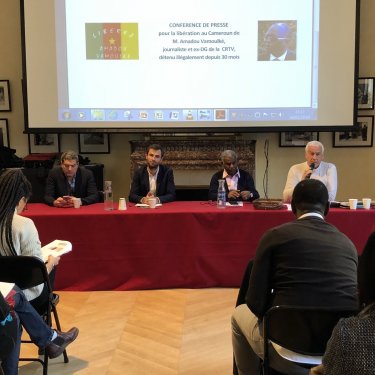Cameroonian journalist’s arbitrary detention referred to UN Working Group

Reporters Without Borders (RSF) announced at a press conference in Paris today that it has asked the United Nations Working Group on Arbitrary Detention to examine the case of Cameroonian journalist Amadou Vamoulké, the former head of state-owned Cameroon
Radio Television (CRTV).
As Amadou Vamoulké is due to appear before the Special Criminal Court on 22 January for the 16th hearing in a trial, RSF has filed a petition to the United Nations Group on Arbitrary Detention (UNWGAD) to examine his case. RSF also reiterated its call for the release of Vamoulké, who has been held on an absurd embezzlement charge in Yaoundé for nearly two and a half years.
Vamoulké is accused of misusing public funds – not for his personal benefit but for the benefit of the public radio and TV broadcaster he ran from 2005 to 2016. However, no supporting evidence or testimony has so far been produced at the trial, in which most of the previous hearings have lasted no more than several minutes. Under the law creating this Special Criminal Court, a verdict should have been issued by the ninth hearing at the latest.
“There can be no doubt about the arbitrary nature of Amadou Vamoulké’s detention, which has continued for two and a half years without a conviction, and its arbitrary nature must be recognized by the UN in order to step up the pressure on the Cameroonian authorities for his release,” said Arnaud Froger, the head of RSF’s Africa desk. “Keeping him in prison constitutes an attack on the vision of independent and ethical journalism that he has defended throughout his career. We urge the Special Criminal Court to end this judicial persecution by ordering his immediate release at the next hearing.”
When investigating Vamoulké’s case in November, RSF found that both Cameroonian and foreign journalists regard him as a model of professionalism, integrity and independence. Former colleagues praised his journalistic boldness, and the fact that he did not hesitate to send reporters to cover sensitive stories such as the fight against terrorism in the north of the country. Vamoulké has also been a strong supporter of media pluralism and an end to the state’s monopoly of TV broadcasting in Cameroon, as well as a staunch advocate of press freedom and the decriminalization of press offences.
RSF has constantly called for an end to the arbitrary detention of journalists in Cameroon and repeatedly condemned RFI correspondent Ahmed Abba’s imprisonment during the 29 months that he was held, until his release on 22 December 2017.
Cameroon is ranked 129th out of 180 countries in RSF’s 2018 World Press Freedom Index.



